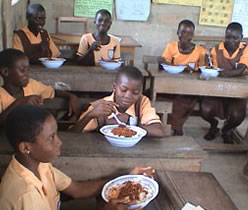Ghana government launches National School Feeding Policy
 Government has launched the Ghana School Feeding policy as part of measures to eradicate extreme poverty and hunger and achieve universal primary education.
Government has launched the Ghana School Feeding policy as part of measures to eradicate extreme poverty and hunger and achieve universal primary education.
The policy provides broad guidelines, strategies and institutional framework for the operationalisation of government policy towards reducing poverty through improved household income and effective local economic development.
The goal of the policy is to deliver a well-organised, decentralised intervention providing disadvantaged school children with nationally adequate, locally produced food thereby reducing poverty through improved household incomes and effective local economic development.
Mr Akwasi Oppong-Fosu, the Minister of State at the Presidency, said the policy envisioned rapid national socio-economic development through a co-ordinated, integrated and accountable national school feeding programme delivering improved nutrition for disadvantaged school children.
He said the policy objectives included the provision of sustainable social development support to children in deprived Ghanaian communities, strengthened collaboration and coordination between national and sub-national; and fostering local economic development in food production.
“The policy provides a crosscutting interventions related to gender-sensitivity and social inclusivity, social accountability, environmental management and sustainability and image building and information management for school feeding,” he said.
Mr Oppong-Fosu said the Ghana School Feeding Programme (GSFP) was initiated in 2005 as social protection intervention on the context of the Comprehensive African Agricultural Development Programme (CAADP) Pillar III.
He noted that the School Feeding Programme provides an opportunity to pursue the country’s commitment to the Sustainable Development Goals 1 and 2, which seek to end poverty in all its forms and to end hunger, achieve food security and improved nutrition while promoting sustaining agriculture.
Nana Oye Lithur, the Minister of Gender, Children and Social Protection, said the school feeding programme covered about 5,285 public basic schools in 216 districts with total enrolment of over 1,728,681 pupils in the country.
She said since August 2015, an estimated GH¢450 million had been released to the programme to pay all outstanding feeding arrears to caterers.
She said the programme had 1.7 million beneficiary children that represented 36.6 per cent of national coverage.
Nana Oye Lithur said statistics from the Ghana Education Service showed that retention of school children who benefited from the programme had increased with an income transfer to assist low income households.
Mr Patrick Acheampong, the National Coordinator of GSFP, said the programme had successfully switched to an electronic payment system which allowed caterers to receive their payment immediately the funds were disbursed.
He said the outfit was working to reinforce the institutional arrangements with adequate capacity to support and sustain effective monitoring and evaluation.
Mr Acheampong said preparations were advanced for the acquisition of biometric verification devices to help track and monitor enrolment and attendance of beneficiary pupils.
Source: GNA

The fact was to put on high a lert after obnoxious premium for nationwide action agains the policy.